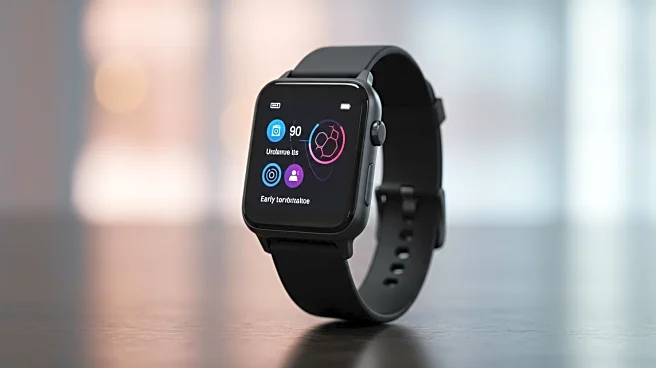What is the story about?
What's Happening?
Aesthetic nurse practitioner Nikki Gooding experienced unusual symptoms such as exhaustion, loss of appetite, and night sweats, which were corroborated by her Oura Ring health tracker indicating abnormal basal body temperature. This led to the discovery of Hodgkin lymphoma. Gooding's experience highlights the role of health trackers in providing early alerts for potential medical conditions. These devices, including Oura Rings and Apple Watches, are increasingly used by Americans to monitor various health metrics such as sleep oxygen levels, stress, and heart rate variability. While these trackers can offer valuable insights, they also present challenges, including false alarms and the illusion of control over one's health.
Why It's Important?
The use of health trackers is significant as they offer a new dimension in personal health management, potentially leading to earlier detection of medical issues. This technology empowers individuals with data that can prompt medical consultations before visible symptoms appear. However, the reliance on these devices also raises concerns about the accuracy of the data and the potential for false alarms. The widespread adoption of health trackers reflects a shift towards proactive health monitoring, which could influence healthcare practices and patient behavior. The devices also contribute to the perception that individuals can control their health outcomes, despite broader societal and environmental factors.
What's Next?
As health trackers become more sophisticated, their integration into healthcare systems may increase, potentially influencing how medical professionals approach patient care. The technology could lead to more personalized health monitoring and early intervention strategies. However, there may be a need for guidelines to address the limitations and potential inaccuracies of these devices. The healthcare industry might also explore partnerships with tech companies to enhance the reliability and utility of health trackers. Public health campaigns could focus on educating users about the benefits and limitations of these devices, ensuring informed usage.
Beyond the Headlines
The rise of health trackers reflects broader societal trends towards self-monitoring and data-driven health management. This development raises ethical questions about privacy and data security, as personal health information becomes increasingly digitized. Additionally, the reliance on technology for health insights may impact traditional healthcare practices, shifting the focus from reactive to proactive care. The cultural implications of this shift include changes in how individuals perceive their health and the role of technology in daily life. Long-term, the integration of health trackers could influence public health policies and the allocation of healthcare resources.















